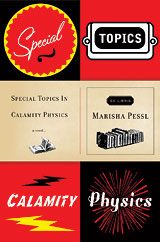
A study in success: Echoing Wolfe, Asheville-raised writer Marisha Pessl turned in her manuscript at 900 pages. Only 400 pages shorter, the published work, Special Topics in Calamity Physics, has made an unlikely splash. People magazine recently chose the densely erudite “mystery” book as its pick of the week. photo by Laura Rose
|
“‘Always live your life with your autobiography in mind,’ Dad was fond of saying. ‘Naturally, it won’t be published unless you have a Magnificent Reason, but at the very least you will be living grandly.'”
So begins Special Topics in Calamity Physics (Viking, 2006), the debut novel by former Ashevillean Marisha Pessl.
It’s the capitalization of “Magnificent Reason” that sets the tone for the book, as both the main character — high-school senior Blue Van Meer — and her professor father Gareth speak a language underscored by Grand Ideas, Complex Theories, Intellectual Inquiry and an almost snooty disdain for Anything Smacking of Pop Culture.
All of which adds up to one of literature’s all-time most pretentious introductions, followed by more than 500 pages of text bearing chapters named for a great-books course. Happily (despite wielding “Physics” in its title), Pessl’s novel isn’t dry; nor is it entirely the showy demonstration of the author’s cleverness, as it may seem from the outset. It is — and this is worth noting, since the unsuspecting reader won’t catch on until one-third of the way along — a thriller.
The parent trap
 |
“Is it me, or is it obvious none of this ends happily,” one of the teenage characters asks.
Well, actually, it’s not obvious, but — like a host of epic mysteries/revisionist histories currently fascinating the readership at large (think The DaVinci Code, The Historian and The Gnostic Gospels) — ambiguity is key.
Physics is the story of Blue’s last year of high school, a year in which she and her father settle into a mountain town based loosely on Asheville. Because Blue’s butterfly-collecting mother died in a freak car accident when Blue was only five, she’s spent her life bouncing from place to place as her highly regarded father pursues research assignments and lecture appointments at various colleges. Usually in a town for just a semester, Blue never really makes friends — that’s where her extensive book knowledge comes in.
“Instead of the people in her life, books are the only things she’s come in contact with,” Pessl explains in a recent interview with Xpress. Hence Blue’s penchant for referencing every detail of her life, footnote style, not with Seinfeld episodes but with encyclopedia excerpts and snippets of the literary canon.
“What if they only pretended to bond vigorously to Dad as lithium does to fluorine (see The Strange Attraction of Opposite Ions, Booley, 1975)?” Blue wonders of her father’s colleagues.
It’s a valid question — because, through constant movement, the teen never experiences enough continuity to notice inconsistencies. “When charting what I knew to be my life,” Blue tells us, “somehow I’d managed to omit an entire continent (see Antarctica: The Coldest Place on Earth, Turg, 1987).”
She remains happily cocooned in the close world of her father and their shared love of knowledge until a crush on a gardener (who keeps popping up in unlikely places), a tentative friendship with a group of classmates, and a film teacher with a hazy past begin to pull her into the “real” world. And that’s when things get interesting.
Blue’s clues
“Growing up in Asheville, I did [UNCA’s] Tanglewood [Children’s] Theatre,” Pessl recalls. “A lot of the other children in the cast were home-schooled. I found that quite interesting — the idea of your parent being your teacher. You’d have someone dedicated to teaching you 24/7 — but you’d miss some of those all-American experiences: high school, dances, prom.”
It was that musing that led to the creation of Blue and Gareth. “I love to watch people and examine why they do what they do,” the author says.
She reveals that many of the sources Blue quotes from are fictitious. But Pessl’s own life experience is at least as exciting as that of her characters. She “was hit by a car while riding her bicycle with training wheels,” her bio notes. She spent three summers in Venezuela, “played a Strumpette in New York City’s first wrestling musical,” and, the bio continues, “the day Marisha wrote Chapter #22 of Calamity Physics — a section of the book in which one of the main characters is found dead — a man committed suicide by jumping off the roof of her apartment building in [London’s] Butlers Wharf.”
Physics took three years to complete and was, Pessl divulges, 900 pages after the first draft. That didn’t stop the author from landing representation (though most literary agents claim to want manuscripts a third that length). Unbelievably, “I sent it out on a Friday and by Monday I had an offer from an agent,” the writer confesses. “As long as [an agent] falls in love with your story, it doesn’t matter how long it is.”
These days, the big question is what’s next on Pessl’s agenda. “Everyone asks me if I’m going to write a sequel,” she says with a laugh. “Maybe in a few books, but not right now.”
So if you want to know what happens to Blue and Gareth, read carefully: The solution to the puzzle isn’t in the final chapter.
“If you follow the clues and read closely, you’ll have the answers,” Pessl says. “The clues are there, I have to say. I was meticulous about inserting them.”
Marisha Pessl reads from Special Topics in Calamity Physics at Malaprop’s Bookstore (55 Haywood St.) on Saturday, Aug. 12. 7 p.m. Free. 254-6734.


Before you comment
The comments section is here to provide a platform for civil dialogue on the issues we face together as a local community. Xpress is committed to offering this platform for all voices, but when the tone of the discussion gets nasty or strays off topic, we believe many people choose not to participate. Xpress editors are determined to moderate comments to ensure a constructive interchange is maintained. All comments judged not to be in keeping with the spirit of civil discourse will be removed and repeat violators will be banned. See here for our terms of service. Thank you for being part of this effort to promote respectful discussion.